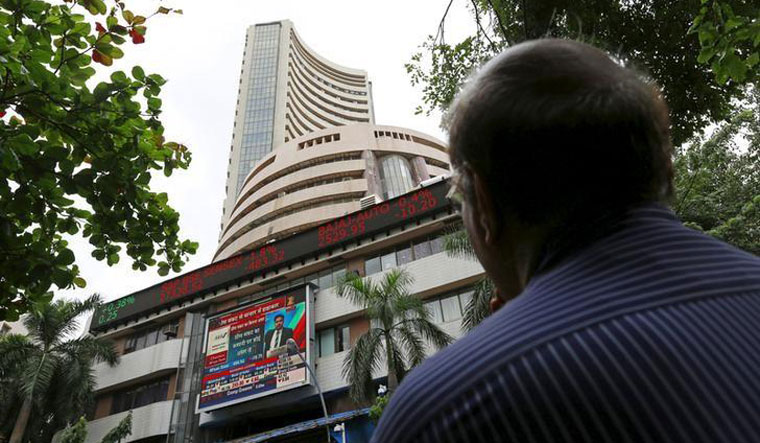India's equity markets ended on a weak note on Friday; benchmark indices declining more than 1.5 per cent, their sharpest fall in a month.
The Bombay Stock Exchange's Sensex tumbled 509 points or 1.5 per cent to close at 33,176 points and the wider NSE Nifty 50 index slipped 165 points or 1.6 per cent at 10,195.15 points.
For the week, the markets were down 0.4 per cent, their third straight weekly drop.
Banks, select auto stocks and capital goods companies were among the laggards on Friday.
While Asian Paints and Tata Motors declined more than 3 per cent, Larsen & Toubro, Sun Pharma, Dr Reddy's, NTPC, Hero MotoCorp and ONGC fell over 2 per cent.
Kotak Mahindra Bank, HDFC Bank, ICICI Bank and IndusInd Bank also declined 1-2 per cent.
Despite the favorable inflation and industrial production numbers released this week, market sentiments remained weak as the fraud at Punjab National Bank continued to weigh on banking sector and there are also growing worries that the tariff hikes by US President Donald Trump will escalate into a wider trade war across the globe, which will hurt businesses.
Investors were also nervous amid the domestic political developments, with the TDP deciding to pull out from the BJP-led NDA government.
"The fallout of PNB scam will impact other sections of the economy. RBI has decided to scrap LoU’s and Letters of Credit, this step will affect credit flows to importers and exporters alike impacting their finances. This will have a cascading impact on the growth as investors continue to lose faith in the state-run banking systems," said Jimeet Modi, CEO of Samco Securities.
Foreign institutional investors were net sellers worth Rs 11,037 crore in India's equity markets in February amid speculation of faster interest rate hikes by the US Federal Reserve this year. Although, so far in March they have bought shares worth Rs 6,380 crore.
Modi expects the equity markets to remain volatile in the coming weeks.
"Indian markets now face twin challenges – a rampaging Trump trying to wage a trade war with US' trading partners and it's disruptive fallout on global trade as well as political issues weighing on the Indian domestic front," said Ajay Bodke, CEO and chief portfolio at Prabhudas Lilladher.
He however feels that the downside for Indian equities may be limited due to a likely strong rebound in corporate earnings over the next 2 quarters and easing of global oil prices providing a relief on the macro front.
In April, all eyes will turn to the Reserve Bank of India's bi-monthly monetary policy announcement. The central bank is expected to largely hold interest rates as inflation has come down for two consecutive months, but remains well above RBI's stated target.
Attention will also shift to corporate earnings for the fourth quarter and management commentaries for the next financial year.


